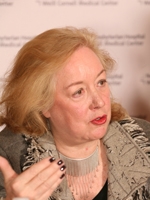Until bans on in-flight smoking took effect in 1988, flight attendants and other airplane crew members were regularly subjected to secondhand smoke. Locked into air-tight chambers for hours at a time with the smoke, flight attendants reported many unpleasant superficial effects: yellow-brown stains in their hair, clothes that reeked of cigarettes, clouds of smoke so dense that attendants couldn't see the length of the cabin.
"My tears were the color of coffee," said Patty Young, a former flight attendant who began flying in 1966 and is currently an advocate for non-smokers.

Dr. Claudia Henschke will lead the FAMRI-IELCAP Collaborative Network projects to study secondhand smoke on never-smokers.
Naturally, there were much more damaging effects, like emphysema, chronic-obstructive pulmonary disorder and lung cancer, which continue to affect—and kill—many of Young's colleagues to this day.
To underscore the health effects of their profession, Young and four other former flight attendants visited Weill Cornell on Feb. 1 where they announced a pledge of $8.7 million on behalf of the Flight Attendant Medical Research Institute (FAMRI) to fund an initiative that will study the effects of secondhand smoke on "never smokers."
The initiative, called the FAMRI-IELCAP Collaboration Network, is a joint effort between FAMRI and the International Early Lung Cancer Action Program, the largest collaborative CT screening effort in the world. Dr. Claudia Henschke, a professor of radiology and radiology in cardiothoracic surgery at Weill Cornell, is principal investigator of I-ELCAP and of the entire FAMRI-IELCAP Collaborative Network projects.
"This is an emotional issue. Every year there are 10,000 American men and 20,000 women who die of lung cancer who have never smoked," said Dr. Henschke. "The good news is that we expect to show that it is possible to screen for disease caused by secondhand smoke early enough for effective treatment."
Over the next five years, the FAMRI-IELCAP Collaborative Network hopes to focus on three primary research objectives: to determine the probability of specific respiratory diseases among patients exposed to secondhand smoke; assess the increased risk of cardiovascular disease from secondhand smoke and develop clinical screening guidelines; and determine new biomarkers for diseases related to tobacco smoke. Five thousand patients will be recruited for the studies, with an emphasis on workers from industries with a high degree of secondhand smoke—including flight attendants and restaurant and entertainment professionals.

Dr. Antonio Gotto
FAMRI was established in 1997 as the result of a class-action lawsuit filed by non-smoking flight attendants against the tobacco industry. $300 million was awarded as a partial settlement and used to start an advocacy organization with a majority of flight attendants serving on the organization's board of trustees.
"We don't have empirical evidence that secondhand smoke is a risk factor for cardiovascular disease," said Dr. Antonio Gotto, dean of Weill Cornell Medical College. "It's through innovative partnerships like this one between Weill Cornell and FAMRI that we are going to better understand, prevent and treat the effects of secondhand smoke."
Photography by Richard Lobell.

